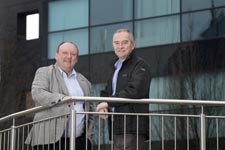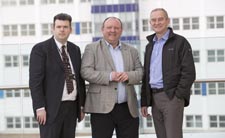Please note, this page has been archived and is no longer being updated.
A pilot programme that transforms academic ideas and inventions into venture capital-backed businesses has achieved a series of highly successful outcomes.

InvestorG8, initially a 12-month pilot funded by the Welsh Government’s A4B programme, launched at Swansea University a year ago. It is the first of its kind in the UK to apply intensive investor readiness support to early-stage academic ideas and paves the way for a fresh approach to the commercialisation of academic ideas.
This concept was devised by Dr Gerry Ronan, Head of IP Commercialisation at Swansea University, who led the programme with the help of technology transfer specialist and former venture capital investor Dr Mark Bowman.
Dr Ronan said, “Knowledge transfer is an important part of what many universities are doing, and it’s vital to the development of areas including life sciences and engineering. At Swansea University we have taken things one step further by applying specialist financial, legal and commercial expertise to these great scientific concepts during their formative stage, helping shape them into investible businesses.”
Dr Bowman said, “There is a wealth of ideas bubbling away inside Swansea University’s laboratories and research spaces; we have world-class scientists here who are coming up with fresh solutions to medical, biological and environmental problems all the time. But it has historically been difficult for universities to bring academic innovations to life through commercialisation. InvestorG8 has proved that by investing packages of specialist expertise in these ideas from day one, they can quickly be made into investable businesses – and businesses which bring benefits to people everywhere.”
Dr Ronan said, “It’s been very hands-on, bridging the gap between research projects which have proven potential and investor-ready opportunities. A key part of this was the continuous assessment and feedback provided by InvestorG8’s panel of venture capital investors, which included Finance Wales, the IP Group, the Welsh business angel network xénos, Arthurian Life Sciences and Merica Fund Management.”
Dr Bowman added, “In my experience, it is very unusual for potential investors to be as involved as early in the technology transfer process as InvestorG8 has facilitated, and it has proved extremely useful. Over the last ten months or so we have seen the impact of the investors’ focused advice on commercial realities at a stage where projects were still capable of being shaped. A further benefit is that we already have significant offers of investment in place for the participating spin out companies.”
As Wales’s attention continues to be focused on the rise of life sciences and technology-based businesses, those at Swansea’s Department of Research and Innovation believe that early investment in academic ideas will produce better and more sustainable opportunities.

Dr Ronan said, “InvestorG8 has been an enormous success *, ensuring that the most is made of the great ideas created here in Swansea. We fully expect to deliver at least a ten-fold return, in terms of value created, on the £450,000 invested by the Welsh Government in this initiative. And we’re confident that other UK universities will see InvestorG8 as a model on which to base their own academic and commercial developments.”
* Each InvestorG8 project was allocated up to £75,000 of funds to further the technical development of their ideas and to shape their commercialisation strategy. Working with a specially assembled team of commercial, legal and regulatory experts, the academics behind these businesses have been supported in developing, realising and beginning to exploit their ideas.
* Last year, eight InvestorG8 projects were selected from Swansea University’s life sciences and engineering departments to take part in InvestorG8. Among these was a group of scientists who had designed a unique solar product which can be integrated into the fabric of buildings to generate renewable energy. Another group is developing a product to combat human resistance to antibiotics.
* All eight InvestorG8 projects are now limited companies, some already actively trading and making great progress in their specialist fields. These include Cholestenix Ltd which is launching a diagnostic tool for the cholesterol-related disorder Cerebrotendinous Xanthomatosis and is in advanced talks with global pharmaceutical companies. Swansea University has also recently announced that is has entered into a licensing arrangement with one of the participating spin out companies, Glyconics Ltd. The technology behind the deal, a medical device for diagnosing and measuring exacerbations associated with chronic obstructive pulmonary disease (COPD) was optimized as part of the InvestorG8 pilot programme.
The Academic Expertise for Business (A4B) Programme is a six year programme of support funded by the Welsh Assembly Government and European Structural Funds aimed at providing a simplified, integrated package of support for knowledge transfer from academia to business.
The aim of the programme is to promote a high value-added economy and to maximise the economic impact of academia and business through technology transfer and the creation of a stronger science, engineering and technology base with clear commercial potential. This will be achieved by the adoption of new processes, systems and services, or by improving substantially those already produced or installed. In turn, this will lead to the creation of high value jobs and ultimately, a value-added economy.
Picture 1: (l to r) Dr. Mark Bowman and Dr. Gerry Ronan
Picture 2: (l to r) Dr. Stephen Donoghue, Dr. Mark Bowman and Dr. Gerry Ronan
- Tuesday 10 February 2015 15.05 GMT
- Tuesday 10 February 2015 15.03 GMT
- Swansea University, Tel: 01792 295050
